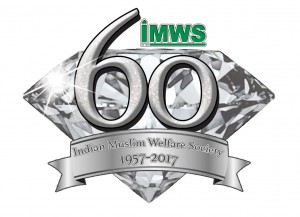
This year marks the diamond anniversary of the Indian Muslim Welfare Society and it is a great honour and a pleasure to be the Chair at this very important occasion. We have over the years faced many challenges and by the grace of the Almighty we have overcome them and we have grown and prospered. In this editorial I feel there is a need to look at our past but also to look at our future. We need to look radically at how we operate and manage our Society and more importantly how we are perceived by the wider community.
Today, we can only imagine what it must have been like for those early migrants from around the Commonwealth, who journeyed across oceans for the opportunities offered by a post war Britain and to better their lives and the lives of future generations.
The challenges faced by those that came to Batley and Dewsbury in the early 50’s and 60’s were many…. notable to speak the language; having to slaughter chickens in the back yard; sharing outside toilets and not to mention men having to work 40 to 50 hours a week on nights.
Of course there were far more obstacles than these, but this short list gives us an understanding of the challenges that were faced by our community. We are immensely grateful to our elders who established the IMWS which then led to the establishments of our immensely successful affiliated masjids/madressahs. Their foresight and vision has enabled us today to enjoy and live in an area with a strong religious and cultural tradition. We are truly indebted to them
In order to continue the value of their efforts we need to build an IMWS that progresses and serves the community for generations to come.
One of the key challenges we are faced with today is around getting volunteers to come forward and be actively involved in the work of the Society. We have today more and more of our young people going to university. They are highly educated and skilled and work in a multitude of professions. If we are going to survive than we need these young people to come forward and provide the future vision and direction for the Society. If this does not happen than I am not sure what the future will look like for the Society.
In the past and currently we are very fortunate in that we have volunteers who give up enormous amounts of their time in attending meetings and overseeing the management of the Centre. This unfortunately cannot be sustained in the longer term. We have to acknowledge that people’s priorities have changed. Young people want to spend more time with their families and their commitment and demands at work unfortunately does not free up the amount of time that we expect people to give to the Society. The expectation of volunteers giving that historic commitment is simply impossible and it is not going to happen.
We should also not think of today’s generation as being lesser than those of before. Their drive, passion, commitment, values are the same; but their lifestyles, commitment to their profession and their families are different, which we should acknowledge.
Instead, as leaders, we need to lay down a strategy that is inclusive and organised so that dedicated volunteers can take on the challenges of trusteeship. We have some wonderful and highly capable people to lead the Society into its next phase, they are only restricted by the over burdening responsibilities and pull on their time.
Going forward we need to look at how we can ensure that we have staff with the right skills that are appropriately remunerated to manage the Society. Elected Trustees should be seen to provide the vision and strategic direction for the Society and not to be involved in the day to day operation of the Society.
We also need to actively look at how we can involve our women in the management of the Society. They represent an equal percentage of the population; they are highly educated and could play an important role in providing future direction for the society.
Embracing change is in our history, we changed our name five times since being established in 1957. Looking at our early objectives, when these were taken on by our affiliate masjids the IMWS moved to representing the community on a social and equality level. We now have a Society that has changed, it is more mixed, this will continue as our young people grow and choose life partners from other ethnic groups. We, as a community organisation, need to move with that change. It is important to preserve our history and stay steadfast to our ideals. However, we do need to be more inclusive of the community that is evolving. Do we need to look at another change? IMWS to Muslim Welfare Society, as we were in 1957, and have a more inclusive membership which still holds fast to our Muslim ideals.
We are and have always been servants of the community. Our strap line ‘For the Community – By the community’ is the code that we should live by. To cement a firm future it is this strap line with the recognition of the modern community that we have to change and enter the next phase in the journey of our Society.
My prayer and wish for the Society is to grow and prosper. We should embrace change and we should spend more time by working together by creating unity rather than disunity.
